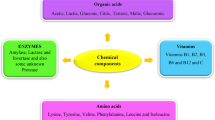Abstract
Purpose of the Review
Glucuronic acid is contained naturally in kombucha beverages due to the associations between bacteria and yeasts during its fermentation. The purpose of this review is to describe the literature related to the hepatoprotective effect associated with glucuronic acid present in different kombucha beverages.
Recent Findings
Although previous research supports beneficial hepatoprotective effects of glucuronic acid consumption from kombucha, these effects are mainly attributed to the tea phytochemicals. However, there are some improvements in methodological deficiencies in some in vivo studies that should be considered. There is no sufficient evidence to generalize the adverse effects of kombucha consumption.
Summary
Consumption of kombucha could be considered a safe practice in healthy populations due to its hepatoprotective effects. The content of the beneficial or toxic components is very variable because it depends on its manufacturing process. In persons with side sickness, other conditions such as pregnancy, and hypersensitivity to some kombucha components, a restriction in its consumption must be advisable.

Similar content being viewed by others
References
Papers of particular interest, published recently, have been highlighted as: • Of importance •• Of major importance
•• Martínez Leal J, Valenzuela Suárez L, Jayabalan R, Huerta Oros J, Escalante-Aburto A. A review on health benefits of kombucha nutritional compounds and metabolites. CyTA - J Food. 2018;16(1):390–9. https://doi.org/10.1080/19476337.2017.1410499. This review focuses on recent findings regarding beneficial effects of kombucha and discusses its chemical compounds, as well as the metabolites resulting from the fermentation process.
Vīna I, Linde R, Patetko A, Semjonovs P. Glucuronic acid from fermented beverages: biochemical functions in humans and its role in health protection. IJRRAS. 2013;14(2):217–30.
Vīna I, Semjonovs P, Linde R, Patetko A. Glucuronic acid containing fermented functional beverages produced by natural yeasts and bacteria associations. IJRRAS. 2013;14(1):17–25.
Choudhary PD, Pawar HA. Recently investigated natural gums and mucilages as pharmaceutical excipients: an overview. J Pharm. 2014;2014:1–9. https://doi.org/10.1155/2014/204849.
Watawana MI, Jayawardena N, Gunawardhana CB, Waisundara VY. Health, wellness, and safety aspects of the consumption of kombucha. Journal of Chemistry. 2015; 15, special issue Nutraceuticals: recent advances of bioactive food components: 1–11. Hindawi Publishing Corporation. https://doi.org/10.1155/2015/591869.
Yavari N, Mazaheri Assadi M, Bamani Moghadam M, Larijani K. Optimizing glucuronic acid production using tea fungus on grape juice by response surface methodology. Aust J Basic Appl Sci. 2011;5(11):1788–94.
Yavari N, Mazaheri-Assadi M, Mazhari ZH, Moghadam MB, Larijani K. Glucuronic acid rich kombucha-fermented pomegranate juice. J Food Res. 2017 Dec 24;7(1):61. https://doi.org/10.5539/jfr.v7n1p61.
Yavari N, Assadi MM, Larijani K, Moghadam MB. Response surface methodology for optimization of glucuronic acid production using kombucha layer on sour cherry juice. Aust J Basic Appl Sci. 2010;4(8):3250–6.
Watawana MI, Jayawardena N, Gunawardhana CB, Waisundara VY. Enhancement of the antioxidant and starch hydrolase inhibitory activities of king coconut water (Cocos nucifera var. aurantiaca) by fermentation with kombucha ‘tea fungus.’ Int J Food Sci Technol 2016;51(2):490–498. https://doi.org/10.1111/ijfs.13006.
Watawana MI, Jayawardena N, Waisundara VY. Enhancement of the functional properties of coffee through fermentation by “tea fungus” (Kombucha). J Food Process Preserv. 2015;39(6):2596–603. https://doi.org/10.1111/jfpp.12509.
Jayabalan R, Malbaša RV, Lončar ES, Vitas JS, Sathishkumar M. A review on kombucha tea-microbiology, composition, fermentation, beneficial effects, toxicity, and tea fungus. Compr Rev Food Sci Food Saf. 2014;13(4):538–50. https://doi.org/10.1111/1541-4337.12073.
Chen C, Liu BY. Changes in major components of tea fungus metabolites during prolonged fermentation. J Appl Microbiol. 2000;89(5):834–9. https://doi.org/10.1046/j.1365-2672.2000.01188.x.
Jayabalan R, Malbaša R V., Sathishkumar M. Kombucha tea: metabolites. In: Fungal Metabolites. Springer International Publishing; 2015. pp. 1–14. https://doi.org/10.1007/978-3-319-19456-1_12-1.
Martini N. Kombucha. Potion or poison? J Prim Health Care. 2018;10(1):93–4. https://doi.org/10.1071/HC15930.
• Villarreal Soto SA, Beaufort S, Bouajila J, Souchard J-P, Taillandier P. Understanding kombucha tea fermentation: A review. J Food Sci. 2018;83(3):580–8. https://doi.org/10.1111/1750-3841.14068ï. The microbiological composition of kombucha is quite complex and still more research is needed in order to fully understand its behavior. This study characterizes the chemical and microbiological composition of the tea and the main factors that may affect its production, anti-inflammatory potential and antioxidant activities.
•• Neffe-Skocińska K, Sionek B, Ścibisz I, Kołożyn-Krajewska D. Acid contents and the effect of fermentation condition of Kombucha tea beverages on physicochemical, microbiological and sensory properties. CyTA - J Food. 2017;15(4):601–7. https://doi.org/10.1080/19476337.2017.1321588. The effect of fermentation conditions on physicochemical, microbiological and sensory properties of kombucha tea beverages was evaluated with emphasis placed on determining sugar and organic acids content, including pro-health glucuronic acid.
• Xia X, Dai Y, Wu H, Liu X, Wang Y, Yin L, et al. Kombucha fermentation enhances the health-promoting properties of soymilk beverage. J Funct foods. 2019;62:103549. https://doi.org/10.1016/j.jff.2019.103549. The antioxidant and inhibition activities to α-glucosidase and α-amylase of kombucha-fermented soymilk significantly increased. The fermentation process with kombucha scoby can enhance the health-promoting properties of soymilk.
Tu C, Tang S, Azi F, Hu W, Dong M. Use of kombucha consortium to transform soy whey into a novel functional beverage. J Funct Foods. 2019;52:81–9. https://doi.org/10.1016/j.jff.2018.10.024.
Nguyen NK, Nguyen HT, Le PH. Effects of Lactobacillus casei and alterations in fermentation conditions on biosynthesis of glucuronic acid by a Dekkera bruxellensis-Gluconacetobacter intermedius kombucha symbiosis model system. Food Biotechnol. 2015;29(4):356–70. https://doi.org/10.1080/08905436.2015.1092446.
Nguyen NK, Nguyen PB, Nguyen HT, Le PH. Screening the optimal ratio of symbiosis between isolated yeast and acetic acid bacteria strain from traditional kombucha for high-level production of glucuronic acid. LWT - Food Sci Technol. 2015;64(2):1149–55. https://doi.org/10.1016/j.lwt.2015.07.018.
Coton M, Pawtowski A, Taminiau B, Burgaud G, Deniel F, Coulloumme-Labarthe L, et al. Unraveling microbial ecology of industrial-scale Kombucha fermentations by metabarcoding and culture-based methods. FEMS Microbiol Ecol. 2017;93(5). https://doi.org/10.1093/femsec/fix048.
Özdemir N, Çon AH. Kombucha and health. J Heal Sci. 2017;5:244–50. https://doi.org/10.17265/2328-7136/2017.05.005.
Yuliana. Hepatoprotective property of kombucha tea. Medicina (B Aires). 2014;45:99–101.
Andlauer W, Kolb J, Fürst P. A novel efficient method to identify β-glucoronidase activity in rat small intestine. Jpen-Parenter Enter. 2000;24(5):308–10. https://doi.org/10.1177/0148607100024005308.
Asadbeygi A, Yarahmadi M, Adineh A, Bahmani M, Kayhanfar F, Hassan Pipelzadeh M, et al. The survey of effect of Kombucha tea on activity of hepatic UDPGT enzyme in mice. Adv Herb Med. 2015;1(2):40–53.
Murugesan GS, Sathishkumar M, Jayabalan R, Binupriya AR, Swaminathan K, Yun SE. Hepatoprotective and curative properties of kombucha tea against carbon tetrachloride-induced toxicity. J Microbiol Biotechnol. 2009;19(4):397–402. https://doi.org/10.4014/jmb.0806.374.
Quiao-Won ME, Teves FG. Characteristics of kombucha fermentation from different substrates and cytotoxicity of tea broth. Sustain Food Prod. 2018;4:11–9. https://doi.org/10.18052/www.scipress.com/sfp.4.11.
Abshenas J, Derakhshanfar A, Ferdosi MH, Hasanzadeh S. Protective effect of kombucha tea against acetaminophen-induced hepatotoxicity in mice: a biochemical and histopathological study. Comp Clin Path. 2012 Dec;21(6):1243–8. https://doi.org/10.1007/s00580-011-1273-9.
Kabiri N, Ahangar Darabi M, Rafieian-Kopaei M, Setorki M, Doudi M. Protective effect of Kombucha tea on liver damage induced by thioacetamide in rats. J Biol Sci. 2014;14(5):343–8. https://doi.org/10.3923/jbs.2014.343.348.
Gharib OA. Effect of kombucha on some trace element levels in different organs of electromagnetic field exposed rats. J Radiat Res Appl Sci. 2014;7(1):18–22. https://doi.org/10.1016/j.jrras.2013.11.002.
Gedela M, Potu KC Hakravarth., Gali VL, Alyamany K, Jha LK. A case of hepatotoxicity related to kombucha tea consumption. J South Dakota State Med Assoc 2016;69(1):26–28.
Kaczmarczyk D, Lochynsky S. Products of biotransformation of tea infusion. Properties and application. Polish J Nat Sci. 2014;24(4):381–92.
•• Gaggìa F, Baffoni L, Galiano M, Nielsen DS, Jakobsen RR, Castro-Mejía JL, et al. Kombucha beverage from green, black and rooibos teas: a comparative study looking at microbiology, chemistry and antioxidant activity. Nutrients. 2019;11(1). https://doi.org/10.3390/nu11010001. Kombucha from rooibos has a low ethanol concentration, and a glucuronic acid amount that was comparable to black tea. Although antioxidant activity was higher in black and green kombucha compared to rooibos, the latter showed an important effect on the recovery of oxidative damage on fibroblast cell lines against oxidative stress.
Zhao ZJ, Sui YC, Wu HW, Zhou CB, Hu XC, Zhang J. Flavour chemical dynamics during fermentation of kombucha tea. Emirates J Food Agric. 2018 Sep 1;30(9):732–41. https://doi.org/10.9755/ejfa.2018.v30.i9.1794.
Nguyen NK, Dong NTN, Le PH, Nguyen HT. Evaluation of the glucuronic acid production and other biological activities of fermented sweeten-black tea by kombucha layer and the co-culture with different Lactobacillus sp. strains. Int J Mod Eng Res. 2014;4(5):12–7.
Jayabalan R, Marimuthu S, Swaminathan K. Changes in content of organic acids and tea polyphenols during kombucha tea fermentation. Food Chem. 2007;102(1):392–8. https://doi.org/10.1016/j.foodchem.2006.05.032.
Beigmohammadi F, Karbasi A, Beigmohammadi Z. Production of high glucuronic of high glucuronic acid level in kombucha beverage under the influence environmental condition. J Food Technol Nutr. 2010;7(226):30–8.
Acknowledgments
The authors thank the Editor, Dr. Corrie Whisner, for their valuable contributions and support on the revision of this manuscript. We also thank the Editor Dennis Khan for tracking the publication of this manuscript. Besides, we appreciate the technical assistance of Vanessa A. Cantú-Hernández, Alejandra K. González-Ruíz, and Lucía Valenzuela-Suárez.
Author information
Authors and Affiliations
Corresponding authors
Ethics declarations
Conflict of Interest
The authors declare that they have no known competing for financial or personal relationships that could have appeared to influence the work reported in this paper.
Human and Animal Rights and Informed Consent
Not applicable
Additional information
Publisher’s Note
Springer Nature remains neutral with regard to jurisdictional claims in published maps and institutional affiliations.
This article is part of the Topical Collection on Functional Foods
Rights and permissions
About this article
Cite this article
Martínez-Leal, J., Ponce-García, N. & Escalante-Aburto, A. Recent Evidence of the Beneficial Effects Associated with Glucuronic Acid Contained in Kombucha Beverages. Curr Nutr Rep 9, 163–170 (2020). https://doi.org/10.1007/s13668-020-00312-6
Published:
Issue Date:
DOI: https://doi.org/10.1007/s13668-020-00312-6




